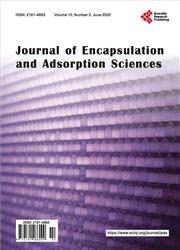Preparation and Characterization of Activated Carbon Based on Wood (Acacia auriculeaformis, Côte d’Ivoire)
引用次数: 14
Abstract
The objective of this work is to prepare one of the best activated carbon (CA) based on wood (Acacia auriculeaformis). The chemical activation method was used for varying the chemical agent namely phosphoric acid H3PO4 (CAA), sodium hydroxide NaOH (CAB), and sodium chloride NaCl (CAS). The physico-chemical analysis of the three activated carbons indicated that, under the conditions of preparation, the activated carbons possess activation efficiencies lower than 50% (41.81% for CAA, 26.25% for CAB and 48.87% for CAS), low ash content (CAA: 5.00%, CAB: 14.90 and CAS: 6.60%) and iodine values ranging from 190.35 mg/g to 380.71 mg/g, suggesting that the good quality of the prepared activated carbon. The surface functional groups using Boehm test and the zero point charge (pHZPC) methods confirmed the acidic, basic and neutral character for CAA, CAB and CAS respectively (CAA: pHZPC = 4.8, CAB: pHZPC = 8.2, CAS: pHZPC = 6.8). The surface specific areas were determined through the liquid phase adsorption of acetic acid and methylene blue using the Langmuir method and BET analysis. Also, the porosity was determined. The BET surface areas of CAA, CAB and CAS were respectively 561.60 m2/g, 265.00 m2/g and 395.40 m2/g. The influence of chemical activation agent on pores formation was confirmed by scanning electron microscopic (SEM) analysis. CAA was selected as the best activated carbon because of its good surface area and good pore volume compared to those found in the literature. Therefore, its application as an adsorbent for effluents treatment could be explored. In addition, the best activating agent for coal from Acacia auriculeaformis was found to be phosphoric acid.木材活性炭的制备及表征(金合欢,Côte d 'Ivoire)
本研究的目的是制备以金合欢为基材的最佳活性炭(CA)。采用化学活化法对磷酸H3PO4 (CAA)、氢氧化钠NaOH (CAB)和氯化钠NaCl (CAS)三种化学药剂进行了改变。对3种活性炭的理化分析表明,在制备条件下,活性炭的活化效率均低于50% (CAA为41.81%,CAB为26.25%,CAS为48.87%),灰分含量低(CAA为5.00%,CAB为14.90,CAS为6.60%),碘值在190.35 ~ 380.71 mg/g之间,表明制备的活性炭质量较好。采用Boehm试验和零点电荷法测定了CAA、CAB和CAS的表面官能团(CAA: pHZPC = 4.8, CAB: pHZPC = 8.2, CAS: pHZPC = 6.8)分别为酸性、碱性和中性。采用Langmuir法和BET分析法对乙酸和亚甲基蓝进行液相吸附,测定其表面比表面积。同时测定了孔隙率。CAA、CAB和CAS的BET表面积分别为561.60 m2/g、265.00 m2/g和395.40 m2/g。通过扫描电镜(SEM)分析,证实了化学活化剂对孔隙形成的影响。与文献中发现的活性炭相比,CAA具有良好的比表面积和孔隙体积,因此被选为最佳活性炭。因此,可以探索其作为一种吸附剂在污水处理中的应用。另外,磷酸是金合欢煤的最佳活化剂。
本文章由计算机程序翻译,如有差异,请以英文原文为准。
求助全文
约1分钟内获得全文
求助全文

 求助内容:
求助内容: 应助结果提醒方式:
应助结果提醒方式:


